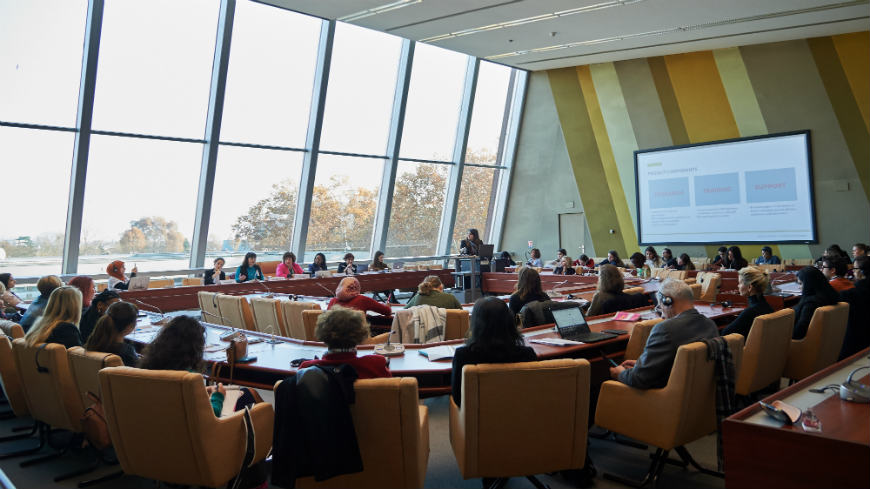“Women's suffrage is not enough to guarantee their representation.” This was a message heard on several occasions during LAB1 (laboratory of ideas) held on 20 November at the World Forum for Democracy in Strasbourg (France).
Sponsored by the Congress of Local and Regional Authorities and the Grand Est region, this LAB entitled “What if she runs? Better representation through higher female participation in elections” was based on the presentation of two initiatives by civil society organisations in Albania and India, both aimed at tackling structural obstacles (especially patriarchal cultures and the influence of traditions) to women’s participation in elections and decision-making processes.
Presenting the initiative to counter the way patriarchal culture in Albanian society detracts from women’s right to vote, Françeska Muço of the ACT for SOCIETY Centre reported on her association’s project to have women cast their votes in a “symbolic ballot box” set up at local markets. Using two mascots to trigger a debate between men and women, this approach has reached more than 18,000 people since 2017 and aims to call into question the practice of family voting, which involves the head of the family voting for all its members.
Joycia Thorat described the initiative of the association Church Auxiliary for Social Action (CASA) to help women make their voices heard and show their skills in rural India with its patriarchal traditions characterised by a caste-driven hierarchical structure. The aim of the initiative is to encourage women to familiarise themselves with a broad range of economic and social issues, especially health and education, in a country where 66% of women work without payment and only 11% of members of parliament are women.
These two projects were welcomed by Congress members Dušica Davidović (Serbia, SOC) and Bryony Rudkin (United Kingdom, SOC). They pointed out, however, that although civil society had an important role the institutions must shoulder their responsibilities with regard to women’s rights. In Ms Davidović’s opinion, substantive progress would be made only by introducing quotas so that 30% of elected representatives were women.
Aicha Ayari, Co-ordinator of the flagship programme “Women Leaders of Tomorrow”, for the Middle East and North Africa region and Euromed of the Belgian association AIM (Actions in the Mediterranean), considered it essential for the two Albanian and Indian NGOs to be able to assess the impact of their initiatives. Ms Muço pointed out that the goal was not to change centuries of patriarchal tradition in two hours, but to start a debate within families that hopefully would help to promote women’s role in decision-making processes.
In the course of the debate Congress member Daniela Giannoni (San Marino) shared her experience of observing elections in Bosnia and Herzegovina, where she had seen many women accompanied into the polling booth by a man. Similar situations were experienced in other countries and were mentioned by several of those taking the floor. A representative of Tunisian civil society emphasised that women must certainly be able to vote, but that was not enough to guarantee their representation and make their expectations heard. To illustrate her point, she said one million women but only 700,000 men had voted in the last elections in Tunisia, a favourable ratio which was not reflected in the constitution of a women-friendly government.
Ambassador Christopher Yvon pointed out that the many different situations encountered meant there was no single solution and it was necessary to seek answers adapted to specific traditions and national circumstances. In his capacity as moderator, the Permanent Representative of the United Kingdom to the Council of Europe concluded the LAB by drawing attention to the importance of the European standards, which should guide all actions in order to bring about real gender parity.




